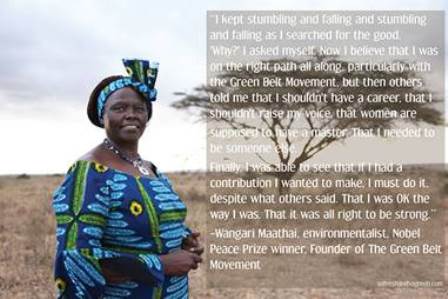WANGARI MAATHAI

NAIROBI, Kenya — Wangari Maathai, the Kenyan environmentalist who began a movement to reforest her country by paying poor women a few shillings to plant trees and who went on to become the first African woman to win a Nobel Peace Prize, died here on Sunday. She was 71.
The cause was cancer, said her organization, the Green Belt Movement. Kenyan news outlets said that she had been treated for ovarian cancer in the past year and that she had been in a hospital for at least a week before she died.
Dr. Maathai, one of the most widely respected women on the continent, played many roles — environmentalist, feminist, politician, professor, rabble-rouser, human rights advocate and head of the Green Belt Movement, which she founded in 1977. Its mission was to plant trees across Kenya to fight erosion and to create firewood for fuel and jobs for women.
Watch short Youtube: http://thewoundedbird.blogspot.com.au/2011/09/wangari-maathai-i-will-be-hummingbird.html
'It's the little things citizens do. That's what will make the difference. My little thing is planting trees.'
Wangari Maathai, Nobel Peace Laureate
'Human rights are not things that are put on the table for people to enjoy. These are things you fight for and then you protect.'
Wangari Maathai
'Today we are faced with a challenge that calls for a shift in our thinking, so that humanity stops threatening its life-support system. We are called to assist the Earth to heal her wounds and in the process heal our own - indeed to embrace the whole of creation in all its diversity, beauty and wonder. Recognizing that sustainable development, democracy and peace are indivisible is an idea whose time has come'
Wangari Maathai
'I'm very conscious of the fact that you can't do it alone. It's teamwork. When you do it alone you run the risk that when you are no longer there nobody else will do it.'
Wangari Maathai The Green Belt Movement: Sharing the Approach and the Experience
'In trying to explain this linkage, I was inspired by a traditional African tool that has three legs and a basin to sit on. To me the three legs represent three critical pillars of just and stable societies. The first leg stands for democratic space, where rights are respected, whether they are human rights, women's rights, children's rights, or environmental rights. The second represents sustainable and equitable management and resources. And the third stands for cultures of peace that are deliberately cultivated within communities and nations. The basin, or seat, represents society and its prospects for development. Unless all three legs are in place, supporting the seat, no society can thrive. Neither can its citizens develop their skills and creativity. When one leg is missing, the seat is unstable; when two legs are missing, it is impossible to keep any state alive; and when no legs are available, the state is as good as a failed state. No development can take place in such a state either. Instead, conflict ensues.'
Wangari Maathai Unbowed